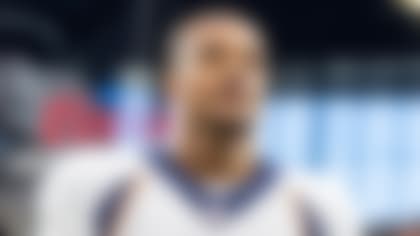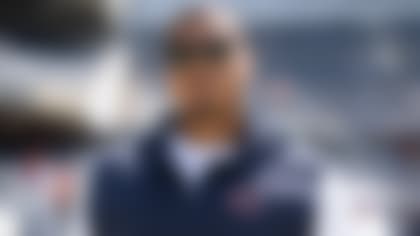GREEN BAY, Wis. -- Jerry Kramer surveyed the surreal scene as quickly as he could with the Giants waiting for the snap and the sounds of 64,892 fans in Yankee Stadium muffled by the howling winds gusting up to 40 mph.
Kramer, the team's right guard, was in his first year taking over place-kicking duties and all he could think about were ghosts of Yankees legends like Babe Ruth and Lou Gehrig.
"'What are you doing in the middle of a baseball field against the New York Giants trying to kick a field goal?'" Kramer recalled. "It was great pressure for me."
Kramer made three field goals, missed two others, and the Packers beat the Giants 16-7 in the 1962 NFL Championship Game (**Game highlights**) for Green Bay's second straight title over New York.
For the Giants, it was more misery.
New York won the 1956 title, but lost in 1958, 1959 and in 1961 (**Game highlights**) in an embarrassing shutout, 37-0, to the Packers. The 1962 game was supposed to be their redemption, but the Giants went on to lose the title again in 1963 before an 18-year postseason drought.
"We were a strong offensive team, and I don't want to blame weather, but it did seem that those championship games were played in unbelievably bad weather," Giants quarterback Y.A. Tittle said. "Holding the ball was impossible. The ball was frozen, like a block of ice. We wore tennis shoes to play in. We just seemed to be snakebit with bad weather."
Baltimore's sudden-death victory over the Giants in the 1958 championship game at Yankee Stadium is often tabbed the greatest game of all time and credited with the rise of football's popularity after being one of the first nationally televised. But the 1961 and 1962 championship games helped speed the NFL's ascent by matching a classic story line -- the rough-and-tumble team from the NFL's smallest outpost led by the Brooklyn-born Vince Lombardi against a flashy, high-octane offense from the media capital of the world.
"Green Bay was a very powerful team, the Giants, we had our tradition also and it carried a lot of press. It was big-time television where everybody could see a championship game, a National Football League game, wherever they were, wherever they lived," Tittle said. "It was a big turning point of the modern popularity of football, I think."
Everyone could see the game, except New York residents. Due to the NFL's blackout policy that lasted until 1973, games, even title games, weren't shown in the home market to help protect gate receipts. Green Bay fans suffered a similar fate in 1961 and for the Ice Bowl in 1967.
"Everywhere you went from the cleaners, to the gas station, to the grocery stores, to the bakery, wherever you had to be, people wanted to know why you lost and what happened," Kramer said. "It's something that lived with us the whole offseason."
When the Giants got to Lambeau Field in 1961 -- then called new City Stadium and built four years earlier at a hefty price of $960,000 -- it was all tundra and about 14 inches of snow needed to be removed in blustery weather.
Tittle struggled to throw and the Giants squandered two early scoring opportunities.
"We depended on the forward pass," Tittle said. "We didn't get the good weather and it hurt us a lot."
Paul Hornung played while on weekend Army leave from Fort Riley, Kan. -- he only missed two games that season despite being called into the service in November -- and scored 19 points off a touchdown, four extra points and three field goals. The performance remains a Packers playoff scoring record.
After both teams made it back to the title game in '62, Giants defensive back Dick Lynch said they were prepared for a physical game. Huff took it as a personal challenge.
"We knew it was going to be a hard-hitting game and that's what football was. It was a great game just as far as making tackles and just whacking guys," Lynch said. "I'm sorry we lost. It was horrible."
Said Kramer: "It was the coach's backyard and his first time back in the big city in a playoff game. We knew how much it meant to him. There was considerable pressure and we understood it was going to be a substantial battle."
Tittle, who had thrown for 33 touchdowns and 3,224 yards, thought that the Giants were finally going to get a break and get their vaunted offense off the ground before the 1962 championship.
"The night before at the field, everything was nice and calm, but the next morning ... ," Tittle said. "We shouldn't have had to depend on the weather, we got beat, but I thought we were the better team."
The elements came back into play with swirling, icy winds up to 40 mph as the temperature only reached 13 degrees. The Giants offense was shut out again, with their lone touchdown coming on a blocked punt.
"Several times we noted that the benches on the sideline, those heavy benches that they sat on over there, they were blown over during the course of the game," Starr said.
"If Taylor went up to get a program, Huff was supposed to hit him. Wherever Taylor went, Huff went with him," Kramer said. "I remember sitting next to Jimmy on the way home and he had his topcoat on. He never took it off. He had it over his shoulder and the guy was shivering almost all the way home. He just got the (heck) beat out of him that day."
Lynch said that he sees some of Taylor in the current Packers' running attack.
"He was tough to bring down. He was kind of like the kid who came from the Giants, Ryan Grant, he refuses to go down even though he isn't as big as Taylor was," Lynch said.
Kramer got voted for the team game ball, which he still has, while the writers picked linebacker Ray Nitschke as the MVP (he got a Corvette in "a classic example of what a lineman's life is like," Kramer quipped).
"The Packers and the Giants go back a long, long time," Harlan said. "The Packers owe a lot of thanks to the New York Giants because Wellington Mara was one of those owners who stood up in the early 1960s and said, 'Let's share our television revenue.'"
"From that point on, we expected to win," Kramer said.
Copyright 2007 by The Associated Press




